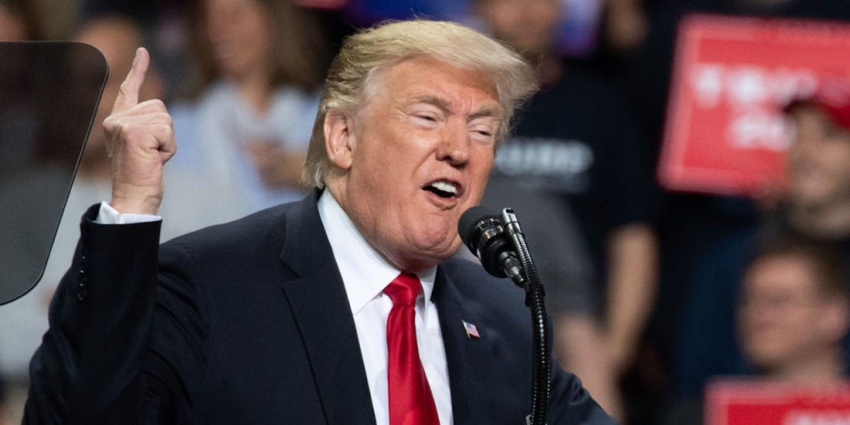Trump is the most dangerous man in the world: Adib-Moghaddam

Professor Arshin Adib-Moghaddam, Chair of the Centre for Iranian Studies at the London Middle East Institute believes that “Trump is the most dangerous man in the world.”
Professor in Global Thought and Comparative Philosophies and Chair of the Centre for Iranian Studies at the London Middle East Institute, also adds that “Donald Trump is the biggest threat to the United States itself, as he has clearly jeopardised the country's interests abroad.”
Here is the full text of the interview.
Q: The United States assassinated General Qassim Soleimani in an act ordered by President Donald Trump. By doing so, the United States appears to have raised tensions with Iran to avoid impeachment so that it can marginalize US domestic affairs. What is your assessment?
A: In my first interviews with you about Donald Trump, immediately when he was elected I said that he is the most dangerous man in the world, exactly because he is essentially void of intelligence, much less strategic acumen. The assassination of General Soleimani and Commander Al-Muhandis is clear evidence for the incompetence of this president to think in logical and rational terms when it comes to world politics, even in terms of US national interests. In fact, Donald Trump is the biggest threat to the United States itself, as he has clearly jeopardised the country's interests abroad.
The timing of the killing is related to the re-election campaign, as you indicate. Unfortunately, the United States continues to be one of the few countries in the world where a chauvinist macho-politician such as Trump can garner votes by killing people. This is unthinkable in Europe, even in the contemporary United Kingdom after the debacle of the Blair years. Indeed, most societies of the world would vote for a politician that talks peace, rather than war.
Q: US Action on Assassination of Sardar Soleimani On the other hand, it shows that the war with Iran is important for the U.S at the present moment. What is your assessment?
A: The state ruling US society has been at war essentially since its inception, certainly in the post Second-World War period. This is a garrison state, armed to the teeth, after all, and ready to use force in contravention to international law and multilateral organizations. The Obama Presidency, where diplomacy and alliance building superseded the politics of sanctions and unilateral war, was an exception, and not the rule. The United States is not one-dimensional, of course, but it seems that the democracy of the country has turned into an increasingly illiberal direction, and one that benefits a presidential policy that is certainly arbitrary, and almost dictatorial. If anything, the fact that this President can simply kill a high-ranking military official in a foreign country without approval of the parliament or in this case the US Congress, reveals the structural deficiency of this democracy.
Q: What is your assessment of Iran's response to this, given the message of Ayatollah Ali Khamenei, who announced that he would take tough revenge on the US?
A: So far Iran and its allies have been giving the best response possible by rallying the people together in a show of unity, that is necessary in order to demonstrate that a war with Iran would have catastrophic consequences. This kind of nationalism as a unifying force, is very different from psycho-nationalism which separates state and society, and makes the latter vulnerable to nefarious outside interference. Politically, the Iranian state is well advised to further rally society behind a just cause, i.e. the defense of Iranian sovereignty and the national independence of the country's allies throughout the region, which are drawn even closer now. Ultimately, Iran needs to start a politico-legal battle against the Trump administration, that exhausts all the opportunities that international law gives the country. A military response is neither necessary, nor prudent in a situation where Iran clearly has the moral high-ground. This in itself avenges the injustices committed against the country, and would be jeopardized if Iranian policies, domestic and foreign would be militarized.
This comprehensive strategy requires a political climate that remains inclusive. The ultimate aim must be to prevent a war and further escalation. Above everything else, there needs to be patience to wait and see if Donald Trump gets re-elected. If he is, then it may be necessary to have a thorough re-assessment of Iran's strategic culture and national security paradigm, including an appraisal of the nuclear programme as a potential part of it. It may be necessary, to minimize the break out capability as a part of this revision.
Q: The UN Special reporter described the assassination of Sardar Soleimani as a violation of international law. What is your assessment?
A: It clearly is, even US politicians agree, and certainly UN officials. There was no declaration of war, the killing of Al-Muhandis and Soleimani happened in Iraq without the approval of the Iraqi state. A drone attack doesn't negate collective and individual criminal culpability. Furthermore, the threat of Donald Trump to attack cultural sites in Iran, should be picked up as a threat of state sponsored terrorism as cultural installations are clearly civilian.
Source: Tehran Times

